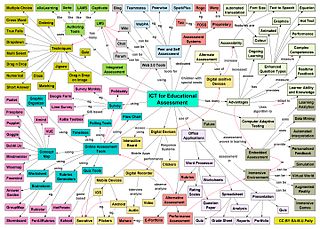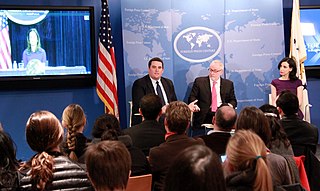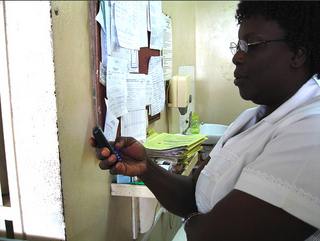Related Research Articles
Uses and gratifications theory (UGT) is an approach to understanding why and how people actively seek out specific media to satisfy specific needs. UGT is an audience-centered approach to understanding mass communication. Diverging from other media effect theories that question "what does media do to people?", UGT instead focuses on "what do people do with media?" It postulates that media is a highly available product and the audiences are the consumers of the same product.

A political campaign is an organized effort which seeks to influence the decision making progress within a specific group. In democracies, political campaigns often refer to electoral campaigns, by which representatives are chosen or referendums are decided. In modern politics, the most high-profile political campaigns are focused on general elections and candidates for head of state or head of government, often a president or prime minister.

Information and communications technology (ICT) is an extensional term for information technology (IT) that stresses the role of unified communications and the integration of telecommunications and computers, as well as necessary enterprise software, middleware, storage and audiovisual, that enable users to access, store, transmit, understand and manipulate information.
A social networking service or SNS is a type of online social media platform which people use to build social networks or social relationships with other people who share similar personal or career content, interests, activities, backgrounds or real-life connections.
Media richness theory, sometimes referred to as information richness theory or MRT, is a framework used to describe a communication medium's ability to reproduce the information sent over it. It was introduced by Richard L. Daft and Robert H. Lengel in 1986 as an extension of information processing theory. MRT is used to rank and evaluate the richness of certain communication media, such as phone calls, video conferencing, and email. For example, a phone call cannot reproduce visual social cues such as gestures which makes it a less rich communication media than video conferencing, which affords the transmission of gestures and body language. Based on contingency theory and information processing theory, MRT theorizes that richer, personal communication media are generally more effective for communicating equivocal issues in contrast with leaner, less rich media.

Digital rhetoric can be generally defined as communication that exists in the digital sphere. As such, digital rhetoric can be expressed in many different forms, including text, images, videos, and software. Due to the increasingly mediated nature of our contemporary society, there are no longer clear distinctions between digital and non-digital environments. This has expanded the scope of digital rhetoric to account for the increased fluidity with which humans interact with technology.
Media psychology is the branch and specialty field in psychology that focuses on the interaction of human behavior with media and technology. Media psychology is not limited to mass media or media content; it includes all forms of mediated communication and media technology-related behaviors, such as the use, design, impact, and sharing behaviors. This branch is a relatively new field of study because of advancement in technology. It uses various methods of critical analysis and investigation to develop a working model of a user's perception of media experience. These methods are used for society as a whole and on an individual basis. Media psychologists are able to perform activities that include consulting, design, and production in various media like television, video games, films, and news broadcasting. Media psychologists are not considered to be those who are featured in media, rather than those who research, work or contribute to the field.

Digital diplomacy, also referred to as Digiplomacy and eDiplomacy, has been defined as the use of the Internet and new information communication technologies to help achieve diplomatic objectives. However, other definitions have also been proposed. The definition focuses on the interplay between internet and diplomacy, ranging from Internet driven-changes in the environment in which diplomacy is conducted to the emergence of new topics on diplomatic agendas such as cybersecurity, privacy and more, along with the use of internet tools to practice diplomacy.

Nomophobia is a word for the fear of, or anxiety caused by, not having a working mobile phone. It has been considered a symptom or syndrome of problematic digital media use in mental health, the definitions of which are not standardized for technical and genetical reasons.

mHealth is an abbreviation for mobile health, a term used for the practice of medicine and public health supported by mobile devices. The term is most commonly used in reference to using mobile communication devices, such as mobile phones, tablet computers and personal digital assistants (PDAs), and wearable devices such as smart watches, for health services, information, and data collection. The mHealth field has emerged as a sub-segment of eHealth, the use of information and communication technology (ICT), such as computers, mobile phones, communications satellite, patient monitors, etc., for health services and information. mHealth applications include the use of mobile devices in collecting community and clinical health data, delivery/sharing of healthcare information for practitioners, researchers and patients, real-time monitoring of patient vital signs, the direct provision of care as well as training and collaboration of health workers.
Social presence theory explores how the "sense of being with another" is influenced by digital interfaces in human-computer interactions. Developed from the foundations of interpersonal communication and symbolic interactionism, social presence theory was first formally introduced by John Short, Ederyn Williams, and Bruce Christie in The Social Psychology of Telecommunications. Research on social presence theory has recently developed to examine the efficacy of telecommunications media, including SNS communications. The theory notes that computer-based communication is lower in social presence than face-to-face communication, but different computer-based communications can affect the levels of social presence between communicators and receivers.

Amit Schejter is Professor of Communication Studies at Ben-Gurion University of the Negev in Israel and Visiting Professor of Communications and co-director of the Institute for Information Policy at the Donald P. Bellisario College of Communications of the Pennsylvania State University. He is currently serving as President of Oranim College.
Keith N. Hampton is professor of media and information at Michigan State University. His research interests focus on the relationship between information and communication technology, such as the Internet, social networks, and community democratic engagement, social isolation, and participation in the urban environment.
Multi-communicating is the act of managing many conversations at one time. The term was coined by Reinsch, Turner, and Tinsley (2008), who proposed that simultaneous conversations can be conducted using an ever-increasing array of media, including face-to-face, phone, and email tools for communication. This practice allows individuals to utilize two or more technologies to interact with each other.

Problematic smartphone use is proposed by some researchers to be a form of psychological or behavioral dependence on cell phones, closely related to other forms of digital media overuse such as social media addiction or internet addiction disorder. Other researchers have stated that terminology relating to behavioral addictions in regards to smartphone use can cause additional problems both in research and stigmatization of users, suggesting the term to evolve to problematic smartphone use. Problematic use can include preoccupation with mobile communication, excessive money or time spent on mobile phones, and use of mobile phones in socially or physically inappropriate situations such as driving an automobile. Increased use can also lead to adverse effects on relationships, mental or physical health, and ensues anxiety if separated from a mobile phone or sufficient signal. Preschool children and young adults are at highest risk for problematic smartphone use.

Richard Ling is a communications scholar who focuses on mobile communication. He was the Shaw Foundation Professor of Media Technology at Nanyang Technological University, Singapore (2013-2021). He has also lived and worked in Norway. He has studied the social consequences of mobile communication, text messaging and mobile telephony. He has examined the use of mobile communication for what he calls micro-coordination, used by teens, and use in generational situations, as a form of social cohesion. Most recently he has studied this in the context of large databases and also in developing countries. He has published extensively in this area and is widely cited. He was named a Fellow of the International Communication Association in 2016. He was named editor of the Journal of Computer-Mediated Communication in 2017.
Urban informatics refers to the study of people creating, applying and using information and communication technology and data in the context of cities and urban environments. It sits at the conjunction of urban science, geomatics, and informatics, with an ultimate goal of creating more smart and sustainable cities. Various definitions are available, some provided in the Definitions section.
Social media in education is the practice of using social media platforms or technology to enhance the education of students. Social media is defined as "a group of Internet-based applications that build on the ideological and technological foundations of Web 2.0, and that allow the creation and exchange of user-generated content". Social media platforms can be used as a strategy to complete assignments or projects in a technical way. Public service announcements and service learning can be done by students as these activities help enhance a student's learning experience and grant them the ability to learn in an online, interactive way.
John Allen Hendricks is a professor whose research focuses on political communication, social media/new media technologies, and the broadcasting industry and is the author of more than ten books on the subjects. He has served as academic department chair since 2009.
Apparatgeist theory is defined as “the spirit of the machine that influences both the designs of the technology as well as the initial and subsequent significance accorded to them by users, non-users and anti-users.” The theory was developed by James E. Katz and Mark Aakhus to explore the social, cultural and material aspects of the mobile and personal communication technologies (PCTs). “Regardless of culture, when people interact with PCTs, they tend to standardise infrastructure and gravitate towards consistent tastes and universal features,” Katz states.
References
- ↑ "James E. Katz - College of Communication". bu.edu.
- ↑ "Emerging Media". bu.edu.
- ↑ "International Communication Association - Home". icahdq.org.
- ↑ James E Katz, Rutgers, The State University of New Jersey, archived from the original on 2010-11-19
- ↑ Katz, James Everett (2008). Handbook of Mobile Communication Studies. ISBN 978-0262113120.
- ↑ Perpetual Contact: Mobile Communication, Private Talk, Public Performance: Amazon.co.uk: James E. Katz: 9780521002660: Books. Cambridge University Press. 21 August 2008. ISBN 9780521002660.
- 1 2 "The Social Media President". Palgrave Macmillan. Archived from the original on 2014-03-16. Retrieved 2014-03-16.